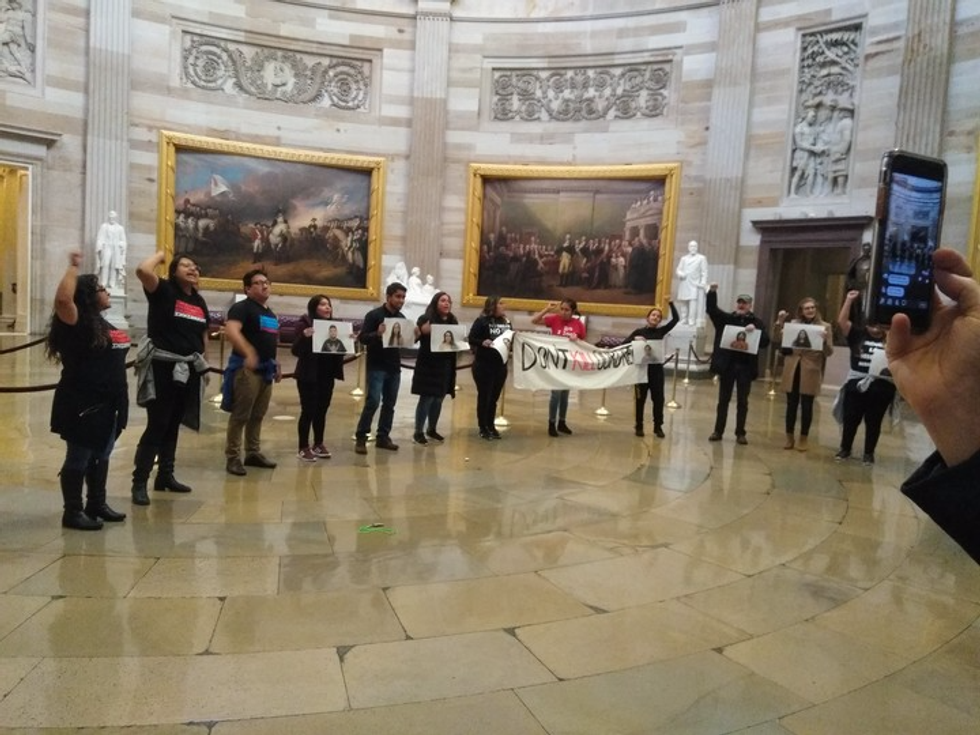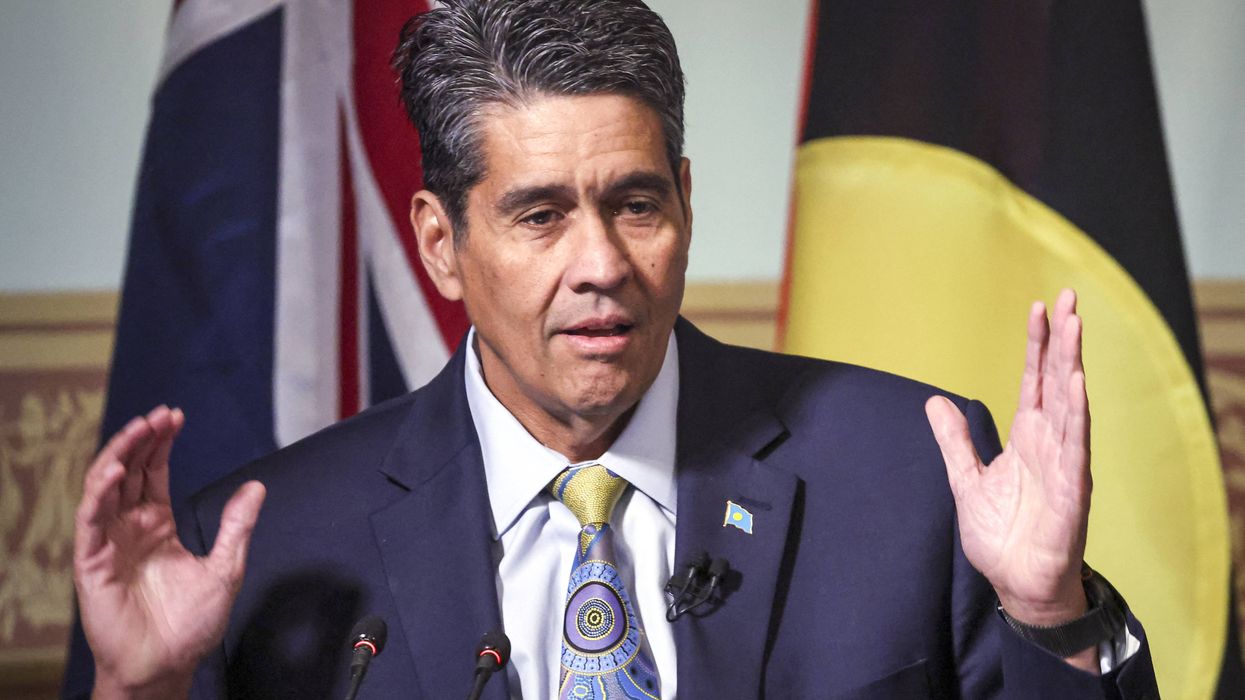December, 21 2017, 04:00pm EDT
For Immediate Release
Contact:
Candice Fortin, 917-244-7206 media@fightforourdream.org, Maria Fernanda Cabello, 281-706-9860 mfcabello91@gmail.com
8 DACA Holders and 5 Allies Have Just Been Arrested Inside The U.S. Capitol Confronting Democrats on Final Days to Pass Spending Bill with the Dream Act
Following the courage of The Dream 7 that stayed in jail for 6 days in a hunger strike, 8 DACA holders and 5 allies continue the fight to pass a Clean Dream Act.
WASHINGTON
While singing "We love our families more than you know, we are fighting to all stay home" and chanting "No Dream No Deal," 8 DACA holders and 5 allies were just arrested inside the rotunda of the U.S. Capitol by U.S. Capitol Police.
"I am risking arrest because I know that the fight is not over," said Renata Mauriz, a DACA holder from Massachusetts in a statement before her arrest. "I am tired of seeing Democrats announce their support for Dreamers and not doing anything about it. My family and I need more than promises and tweets, we need actions. Every day where I don't know if I will lose my DACA is a day where my life is disrupted. I will continue disrupting politicians until they meet our demands."
With just one more day remaining prior to the vote on the spending bill, the Our Dream coalition and undocumented youth are continuing to push Sen. Schumer (D-NY) and all Democrats to reject any version of the spending bill that does not include permanent protection for undocumented youth. Following a day of Dream Act protests throughout Washington, D.C. the 8 DACA holders and 5 allies united in a circle in the middle of the U.S. Capitol Rotunda while holding a banner with "No Dream No Deal" and the faces of the Dream 7.
"Because of the 6 day strike from the Dream 7, Sen. Menendez (D-NJ) and others came out today in support of "No Dream No Deal"" said Oswaldo Rodriguez, a DACA holder from New Jersey. "This follows the full support of the Congressional Hispanic Caucus in the Senate to include a Clean Dream Act on the spending bill. It is now up to Sen. Schumer (D-NY) to do the same."
LATEST NEWS
US Launches Christmas Strikes on Nigeria—the 9th Country Bombed by Trump
Trump—who calls himself "the most anti-war president in history"—has now bombed more countries than any president in history.
Dec 25, 2025
President Donald Trump—the self-described "most anti-war president in history"—has now ordered the bombing of more countries than any president in history as US forces carried out Christmas day strikes on what the White House claimed were Islamic State militants killing Christians in Nigeria.
"Tonight, at my direction as Commander in Chief, the United States launched a powerful and deadly strike against ISIS Terrorist Scum in Northwest Nigeria, who have been targeting and viciously killing, primarily, innocent Christians, at levels not seen for many years, and even Centuries!" Trump said Thursday in a post on his Truth Social network.
"I have previously warned these Terrorists that if they did not stop the slaughtering of Christians, there would be hell to pay, and tonight, there was," the president continued. "The Department of War executed numerous perfect strikes, as only the United States is capable of doing."
"Under my leadership, our Country will not allow Radical Islamic Terrorism to prosper," Trump added. "May God Bless our Military, and MERRY CHRISTMAS to all, including the dead Terrorists, of which there will be many more if their slaughter of Christians continues."
A US Department of Defense official speaking on condition of anonymity told the Associated Press that the United States worked with Nigeria to conduct the bombing, and that the government of Nigerian President Bola Tinubu—who is a Muslim—approved the attacks.
It was not immediately known how many people were killed or wounded in the strikes, or whether there are any civilian casualties.
The Nigerian Ministry of Foreign Affairs said that “terrorist violence in any form, whether directed at Christians, Muslims, or other communities, remains an affront to Nigeria’s values and to international peace and security."
The US bombings followed a threat last month by Trump to attack Nigeria with “guns-a-blazing" if the country's government did not curb attacks on Christians.
Northwestern Nigeria—including Sokoto, Zamfara, Katsina, and parts of Kaduna State—is suffering a complex security crisis, plagued by armed criminal groups, herder-farmer disputes, and Islamist militants including Islamic State West Africa Province (ISWAP/ISIS) and Boko Haram. Both Christians and Muslims have been attacked.
Since emerging in Borno State in 2009, Boko Haram has waged war on the Nigerian state—which it regards as apostate—not against any particular religious group. In fact, the majority of its victims have been Muslims.
"According to the Armed Conflict Location and Event Data Project, more Muslims than Christians have been targeted in recent years," Chloe Atkinson recently wrote for Common Dreams. "Boko Haram has massacred worshipers in mosques, torched markets in Muslim-majority areas, and threatened their own coreligionists."
"The crisis in Nigeria is not a holy war against Christianity."
"It is true that Christian communities in the north-central regions have suffered unimaginable horrors as raids have left villages in ashes, children murdered in their beds, and churches reduced to rubble," she said. "The April massacre in Zike and the June bloodbath in Yelwata are prime examples of the atrocities taking place in Nigeria."
"The crisis in Nigeria is not a holy war against Christianity," Atkinson continued. "Instead, it’s a devastating cocktail of poverty, climate-driven land disputes, and radical ideologies that prey on everyone and not just any distinct group."
"By framing Nigeria’s conflict as an existential threat to Christians alone, Trump is not shining a spotlight on the victims," she added. "Instead, he is weaponizing right-wing conspiracy theories to stoke Islamophobia, the same toxic playbook he used to fuel his ban on Muslims, and which left refugee families shattered at America’s borders."
Former libertarian US Congressman Justin Amash (R-Mich.) noted on X that "there’s no authority for strikes on terrorists in Nigeria or anywhere on Earth," adding that the 2001 Authorization for Use of Military Force (AUMF)—which was approved by every member of Congress except then-Rep. Barbara Lee (D-Calif.)—"is only for the perpetrators of the 9/11 attacks."
"The War Powers Resolution doesn’t grant any authority beyond the Constitution," Amash added. "Offensive military actions need congressional approval. The Framers of the Constitution divided war powers to protect the American people from war-eager executives. Whether the United States should engage in conflicts across the globe is a decision for the people’s representatives in Congress, not the president."
In addition to Nigeria, Trump—who says he deserves a Nobel Peace Prize—since 2017 has also ordered the bombing of Afghanistan, Iran, Iraq, Libya, Pakistan, Somalia, Syria, and Yemen, as well as boats allegedly transporting drugs in the Caribbean Sea and Pacific Ocean. Trump has also deployed warships and thousands of US troops near Venezuela, which could become the next country attacked by a president who campaigned on a platform of "peace through strength."
That's more than the at least five countries attacked during the tenure of former President George W. Bush or the at least seven nations attacked on orders of then-President Barack Obama during the so-called War on Terror, which killed more than 940,000 people—including at least 432,000 civilians, according to the Costs of War Project at Brown University's Watson Institute for International and Public Affairs.
Trump continued the war on ISIS in Iraq and Syria started by Obama in 2014. Promising to "bomb the shit out of" ISIS fighters and "take out their families," Trump intensified the US campaign from a war of "attrition" to one of "annihilation," according to his former defense secretary, Gen. James "Mad Dog" Mattis. Thousand of civilians were killed as cities such as Mosul, Iraq and Raqqa, Syria were flattened.
Trump declared victory over ISIS in 2018—and again the following year.
Some social media users suggested Trump's "warmongering" is an attempt to distract from the Epstein files scandal and alleged administration cover-up.
"Bombing Nigeria won’t make us forget about the Epstein files," said one X user.
Keep ReadingShow Less
'Unhinged' Trump Wishes 'Merry Christmas to All, Including the Radical Left Scum'
"Nothing more Christian than to be a hateful wretched fuck on Jesus’ birthday," quipped one critic.
Dec 25, 2025
In a message called typically on-brand by observers, US President Donald Trump wished "Merry Christmas to all"—including his political opponents, whom he described in decidedly unchristlike language.
"Merry Christmas to all, including the Radical Left Scum that is doing everything possible to destroy our Country, but are failing badly," Trump said Christmas Eve on his Truth Social network.
"We no longer have Open Borders, Men in Women’s Sports, Transgender for Everyone, or Weak Law Enforcement," the president added. "What we do have is a Record Stock Market and 401K’s, Lowest Crime numbers in decades, No Inflation, and yesterday, a 4.3 GDP, two points better than expected. Tariffs have given us Trillions of Dollars in Growth and Prosperity, and the strongest National Security we have ever had. We are respected again, perhaps like never before. God Bless America!!!"
While nothing new—Trump has used past Christmas messages to tell people he doesn't like to "go to hell" and "rot in hell"—observers, including some MAGA supporters, were still left shaking their heads.
"Radical Left Scum" 😂🤣😂🤣😂🤣Christmas greetings from a liar, traitor, pedophile, and overall shitstain upon society.
[image or embed]
— Bill Madden (@maddenifico.bsky.social) December 24, 2025 at 9:00 PM
"Nothing more Christian than to be a hateful wretched fuck on Jesus’ birthday!" liberal political commentator Dean Withers said on X.
Another popular X account posted: "A sitting president of the United States using Christmas Day to spew venom at fellow Americans he calls 'Radical Left Scum' isn’t just unpresidential—it’s unhinged, un-Christian, and utterly beneath the office."
"This is the behavior of a bitter, small man who can’t even pretend to unify for one holy day," she added. "Shameful. Disgraceful. Pathetic."
Keep ReadingShow Less
Palau Signs Controversial $7.5 Million Deal to Take 75 Trump Deportees
"What if we spent the $100,000 per person in America setting them up with housing assistance, healthcare, education, etc?" asked one critic.
Dec 25, 2025
Palau said Wednesday that it has agreed to take in up to 75 people deported from the United States during President Donald Trump's purge of unauthorized immigrants in exchange for millions of dollars in financial assistance—a move that has sparked considerable opposition among the Pacific archipelago nation's roughly 18,000 inhabitants.
The office of Palauan President Surangel Whipps Jr. announced a memorandum of understanding with the United States under which the country will receive $7.5 million in assistance in exchange for taking in 75 third-country deportees who cannot be repatriated to their countries of origin.
Earlier this week, US State Department Principal Deputy Spokesperson Tommy Pigott said the people who will be sent to Palau have “no known criminal histories," as is the case with the vast majority of unauthorized immigrants in the United States, who have committed no crime other than the mere misdemeanor of entering the country illegally.
However, Palauans have voiced concerns over US Secretary of State Marco Rubio's remarks during a Cabinet meeting earlier this year in which he said that, “We want to send some of the most despicable human beings—perverts, pedophiles, and child rapists—to your countries as a favor to us."
Whipps said Wednesday that the relocation plan involves “people seeking safety and stability."
“These are not criminals,” the president said during earlier debate on the proposal. “Their only offense was entering the United States illegally and working without proper permits.”
However, Palau's Congress and its influential Council of Chiefs have twice rejected the transfers.
Piggot's statement "highlighted US commitments to partner with Palau on strengthening the country’s healthcare infrastructure, increasing Palau’s capacity to combat transnational crime and drug trafficking, and bolstering Palau’s civil service pension system."
Palau, which was administered by the US from 1947-94 and is now associated with the United States under the 1994 Compact of Free Association, which guaranteed the country nearly $900 million economic aid over 20 years in exchange for exclusive US military access.
The country's foreign policy often tracks closely to that of the US. For example, Palau is sometimes among the handful of usually similarly small nations that vote along with the United States and Israel against United Nations resolutions condemning Israeli crimes or affirming Palestinian rights.
Other developing nations including Eswatini, Rwanda, South Sudan, and Uganda have also agreed to take in US deportees or are considering doing so.
Reactions to the US-Palau agreement drew criticism on social media, where one X user called the deal a "bribe" and another popular Bluesky account asked, "What if we spent the $100,000 per person in America setting them up with housing assistance, healthcare, education, etc?"
Keep ReadingShow Less
Most Popular



